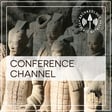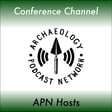Become a Creator today!Start creating today - Share your story with the world!
Start for free
00:00:00
00:00:01

067 - EAA2019 - Kate Geary
Tristan of the APN talks to Kate Geary at EAA2019 about development of training and pathways into the proffession.
Kate Geary is the Head of Professional Development and Practice at Chartered Institute for Archaeologists
Recommended
Transcript
Exploring Mentoring in Archaeology
00:00:00
Speaker
You're listening to the Archaeology Podcast Network. I'm Kate Gary and I work for the Chartered Institute for Archaeologists. So today this morning you had a session about training new archaeologists or training into archaeology. What was the title and what was that about?
00:00:16
Speaker
The session was, the title was Mentoring for Archaeologists and we were looking at mentoring systems, looking at systems that other organisations use, but also thinking about how mentoring might be introduced for archaeologists and what stages of a career that might be useful.
Learning from External Mentoring Systems
00:00:34
Speaker
And what other kind of, what kind of other organisations are you looking at? Is it like construction industry? Is it like materials? Which direction are you looking?
00:00:46
Speaker
We were trying to look at different directions actually, it doesn't work brilliantly because trying to get people from outside archaeology to EAA is quite difficult because of the cost. But we looked at, in the UK, the Institute for Conservation, they run a, they're our sister body representing conservators and restorers and we were looking at their system that they run.
00:01:05
Speaker
which hooks up accredited their accredited members as mentors for people coming through their accreditation system to support them with that but also supports general career development and the other thing then we were trying to look at was the non-arcological mentoring and coaching systems like
Adapting Non-Archaeological Mentoring
00:01:24
Speaker
in the UK, again, the Claw Leadership Program and things like that, whether we can tap into mentoring, say on skills like project management or communications and things like that, that don't necessarily have to be archaeological, but archaeologists can benefit from.
Defining Career Pathways in Archaeology
00:01:40
Speaker
It's interesting because obviously archaeology doesn't really seem to have defined, like, pathway, so it is one of these things, I guess, that SIFA's trying to then develop for the next couple of years.
00:01:52
Speaker
It is and it's difficult because obviously, as you know, there are so many different routes into archaeology. There are so many different directions that you might take once you're in archaeology. And if you talk to most, I think an awful lot of professionals, their pathways aren't very well
00:02:11
Speaker
defined how they got to where they are, doesn't necessarily follow a clear route.
Flexible Career Models in Archaeology
00:02:15
Speaker
And that's something colleagues in Scotland actually have been thinking about. Cara Jones, who's on the industry group for developing apprenticeships.
00:02:24
Speaker
in Scotland, they've been looking at, rather than trying to define pathways, actually producing examples of how they got different job roles and what they've done to get into that job role, and trying to pick out what the key points were, what made the difference that meant that they ended up in that job. Because I think if you start to, we were starting to try and do it through qualification routes. So thinking about if you start off with an undergraduate degree that's a very general,
00:02:54
Speaker
say bachelor's, bachelor of arts in archaeology where you might go to get then the graduate training that you need that gets you into a first job or
Non-Linear Career Pathways
00:03:03
Speaker
potentially in the future if you start off as an apprentice, where do you get the academic background to that? And so pathways that, I'm waving my arms around like anybody can see me, but aren't linear. So there's not a, you have to do this. If you want to be this, you have to do this, this and this, but just sort of picking out different options that are available. But I think one of the things that's really difficult, and we see this all the time at SIFA when people apply to be accredited,
Defining Competence in Archaeology
00:03:33
Speaker
is we're not very good at describing competence in archaeology because we come from an academic background and an academic discipline. We're good at knowledge and qualifications but competence is quite difficult to describe and how but we've had national occupational standards for
00:03:52
Speaker
nearly 20 years. So we ought to be getting better at that and I think you see that all over when employers are setting out job descriptions, when people are writing their CVs, when we're thinking about the skills we need, what can you actually do and how do you describe that is quite a challenge.
00:04:30
Speaker
Thank you very much.

